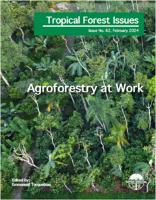| dc.contributor.advisor | Somarriba, Eduardo | |
| dc.contributor.advisor | Chomba, Susan | |
| dc.contributor.advisor | Ganz, David | |
| dc.contributor.advisor | Garrity, Dennis | |
| dc.contributor.advisor | Scherr, Sara | |
| dc.contributor.editor | Torquebiau, Emmanuel | |
| dc.contributor.other | Tropenbos Foundation, Wageningen (Países Bajos) | |
| dc.date.accessioned | 2024-04-02T17:10:49Z | |
| dc.date.available | 2024-04-02T17:10:49Z | |
| dc.date.issued | 2024 | |
| dc.identifier.uri | https://repositorio.catie.ac.cr/handle/11554/12633 | |
| dc.description | Referencia digital | es_ES |
| dc.description.abstract | This issue contextualizes agroforestry in four introductory articles in terms of economic viability and resilience, gender inclusiveness, interactions with climate change and biodiversity and barriers to adoption. We then present 26 case studies from Africa, Asia, and Latin America that show the clear and tangible benefits from the adoption of agroforestry. These 26 examples of agroforestry at work, from a range of developing countries, all show that agroforestry provides direct and indirect benefits to farming families and the wider economy. The well-documented case studies show that agroforestry “works” — it contributes to improved livelihoods (including direct cash income), subsistence activities, employment and other community benefits. In highlighting the reasons for its success in a range of contexts, we hope to demonstrate that agroforestry can spread, encouraging other farmers to develop and expand more diversified, productive and resilient farming systems. Depending on the local context and individual traditions and perceptions, different farmers will have a preference for different agroforestry practices. This shows the importance of developing locally owned agroforestry production systems in order to achieve the full range of benefits. The articles in this issue describe a wide range of agroforestry practices from an array of environments and socioeconomic conditions. | es_ES |
| dc.description.sponsorship | Tropenbos Foundation, Wageningen (Países Bajos) | es_ES |
| dc.language.iso | en | es_ES |
| dc.relation.uri | http://doi.org/10.55515/OEQC4236 | es_ES |
| dc.subject | Agroforesteria||agroforestry||agrosilvicultura||agroforesterie | es_ES |
| dc.subject | Viabilidad económica||economic viability||viabilidade económica||viabilité économique | es_ES |
| dc.subject | Resiliencia forestal||forest resilience||undefined||résilience des forêts | es_ES |
| dc.subject | Integración de la perspectiva de género||gender mainstreaming||integração da perspectiva de género||intégration des questions de genre | es_ES |
| dc.subject | Efectos del cambio climático||climate change impacts||undefined||effets du changement climatique | es_ES |
| dc.subject.other | Sede Central | es_ES |
| dc.title | Agroforestry at work | es_ES |
| dc.type | Revista | es_ES |
| dc.identifier.publisher | Tropenbos Foundation | es_ES |
| dc.journal.issueNumber | No.62 | es_ES |
| dc.journal.pages | 208 páginas | es_ES |
| dc.identifier.status | openAccess | es_ES |
| dc.subject.sdg | ODS 13 - Acción por el clima | es_ES |


